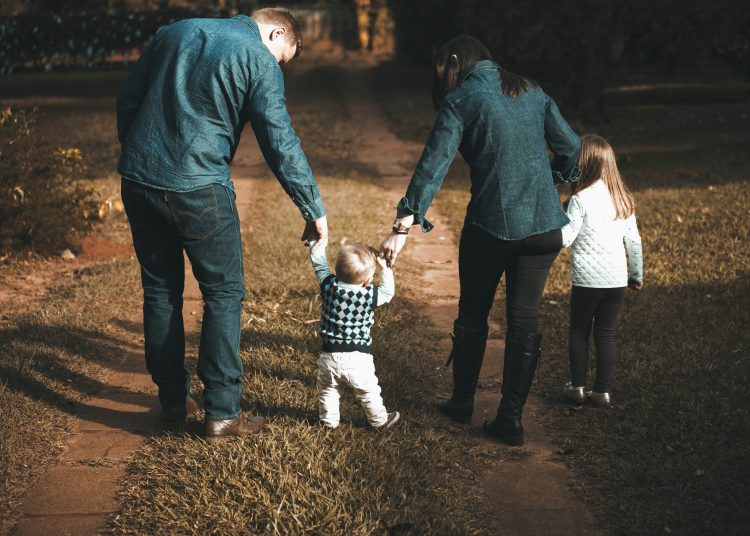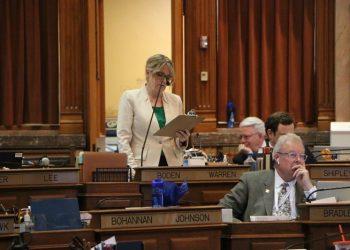DES MOINES, Iowa – A parental rights bill, HF 714, sponsored by State Rep. Eddie Andrews, R-Johnston, was introduced on Wednesday and passed out of subcommittee and the Iowa House Judiciary Committee by a 14 to 7 vote on Thursday to survive the first funnel.
The bill reflects and would codify case law involving parental rights. It would create a new section in the Iowa Code.
The bill affirms that parental rights are fundamental.
“The right to direct the upbringing, rearing, associations, care, education, custody, and control of a parent’s child is a parent’s fundamental right,” the bill reads.
The bill requires that state action infringing on parental rights requires strict scrutiny by the courts and that the action is narrowly tailored to serve a compelling government interest.
The legislation also states that parents are to be presumed fit and that the parents’ actions are in the best interest of the child. That presumption can only be overcome by clear and convincing evidence.
The bill also states that a parent’s marital status does not diminish that parent’s fundamental right.
“By codifying the standards that are currently recognized by the Iowa judiciary, it will safeguard those standards in the future,” Barb Heki, representing ParentalRights.org, told members of the subcommittee on Thursday morning.
She said that every subsection of the bill came from an Iowa judicial ruling that concluded in favor of parents.
“Another key benefit to this legislation is there isn’t a place in the current Iowa Code for agencies of the state to know the proper standard to apply when they’re making decisions. We can point to the case law and court opinions, but we can’t point to the statute right now because there is none,” Heki added.
She stated that ten states currently have parental rights statutes: Arizona, Colorado, Idaho, Kansas, Michigan, Nevada, Oklahoma, Texas, Virginia, and Wyoming.
Chaney Yeast with Blank Children’s Hospital said they were undecided but wanted more information. She said she was concerned about a potential conflict with Iowa’s child abuse laws.
“Is that a parent’s right to send their child to bed without dinner because of disciplinary action? Absolutely. Is it a parent’s right to withhold food for two days? Two weeks? That’s when things start to get more gray, she said.
Kelly Meyers, with the Iowa County Attorneys Association, wanted to hear from Juvenile Court about the bill but said she remembered from law school that parental rights were not fundamental rights.
Amy Campbell with the Iowa Coalition Against Sexual Abuse had similar concerns. She said they were concerned specifically with the strict scrutiny piece of the legislation.
Andrews, who was not part of the subcommittee and testified in favor of the bill, said the bill’s purpose was to reestablish what was already in Iowa case law.
“Parents are the fundamental authority for their children as it relates to education and upbringing. The purpose of this bill is twofold. One, it’s pre-emptive. We’ve seen state overreach in many states,” he said.
Andrews said the second purpose is to clarify what is already in the courts.
He also affirmed that this legislation does not change the state’s ability to remove a child from their home in child abuse or neglect cases.
State Rep. Mary Wolfe, D-Clinton, affirmed that the Iowa Supreme Court had interpreted fundamental rights within the Iowa Constitution more broadly than the U.S. Supreme Court had with the U.S. Constitution.
“My concern with creating a new chapter and a new statute to say that basically for everything – upbringing, rearing associations, character custody and control of a child – it’s fundamental and that you have to review any restrictions on that using strict scrutiny. There’s a lot going on there. And I’m afraid that there could be some collateral consequences,” she said.
Wolfe said she was also concerned that the bill could shut the door on grandparents’ rights.
“One big concern is over the years, I’ve worked with grandparents who desperately would like something in code to allow them even the most minimum ability to have contact with grandchildren when the relationship between the parents and the grandchildren is falling apart. I think that under these current Iowa Supreme Court rulings, there is a narrow path forward for that, that will not interfere with the fundamental right that our Supreme Court has found. I think that under the language in this bill, that’s gone,” she added.
Wolfe said she would not support the bill. “Not because I think it’s a horrible idea. I just think there’s a lot of moving parts,” Wolfe said. She added that she wanted to ensure the bill did not eliminate grandparents’ possibility of having some visitation rights.
State Rep. Skyler Wheeler, R-Orange City, supported the bill.
“I guess I’m not convinced that this language would make it harder to go after abusers. I’m certainly open to having that discussion if you guys would like to have that discussion,” he said.
“As a parent, and a parent that just became a parent a little over two years ago, some of these issues hit home a little more than they ever would have before that. And so I do look at us and say, parents, by and large, they know what’s best for their children, and they have the best interests of their children at heart. Yes, there are bad actors. There are bad actors in every aspect of life, including politics,” Wheeler added.
State Rep. Brian Lohse, R-Bondurant, said he could see both sides but supported the bill so it could move forward and they could continue to discuss it.
“If indeed this really codifies just regular case law, it really shouldn’t have an impact on what goes on today. But I am concerned a little bit about those unintended consequences. I hadn’t thought about the path forward with grandparents’ rights. And while I hope that someday we can find that narrow path to give them some kind of fit there. If that’s the case, that’s an unintended consequence. I think we want to make sure we’re not foreclosing certainly the impact on the termination portion of an adoption proceeding, how it might impact child abuse laws, in codifying this, as opposed to just leaving in case law. I think those are questions that need to be vetted, and more information needs to be received,” he stated.
During the Iowa House Judiciary Committee, Wolfe reiterated her concern about the bill. State Rep. Steven Hansen, D-Sioux City, said that it had been a while since he worked in family law but thought there was a conflict with Iowa Code 232.
“Quite often, the best interests of the child supersede the right to parent,” he said. Hansen also said that the Indian Child Welfare Act needs to be considered.
State Rep. Christina Bohannan, D-Iowa City, said she supports parental rights but doesn’t see the need for the bill.
“I don’t see the need to codify into state code, a constitutional right. And I do think that we run the risk of oversimplification,” she said.
Bohannan said there is more nuance in the law.
“The fact is that when we look at other constitutional rights, free speech, voting, we cannot say across the board that every sort of application of those rights is subject to strict scrutiny. That’s just not true. And I worry a lot about just trying to kind of in shorthand quickly put in code that parental rights are fundamental and always subject to strict scrutiny. I really think that that’s going to run into some problems and some and some unintended consequences,” she added.
In his closing comments, Lohse, who chaired the subcommittee and was the bill manager in the committee meeting, said he welcomed the conversation going forward and then moved the bill for a vote.
Listen to the subcommittee hearing below:
Listen to the committee debate below:















